#how often do you think of Ancient Rome
Text

79 notes
·
View notes
Text
It's the late Roman Republic...
Now put in the tags what you selected and who you THINK it's referring to... Because I sneakily had at least two people in mind when I made each option and when the poll is over I'll reveal who I had in mind for each option
#roman history#ancient rome#roman empire#how often do you think about the roman empire#ancient history#julius caesar#pompey#augustus#pompeius magnus#caesar#the roman empire is my roman empire#lucullus#crassus#Marius#gaius marius#marian reforms#sulla#pompey the great#mark antony#brutus#Hamilton#and peggy#lepidus#marcus agrippa#sextus pompey#octavian#the Gracchi#Gracchi brothers
135 notes
·
View notes
Text
what do you mean " how often do you think about the Roman Empire" ? bold of you to assume it's multiple times a day and not continuous toughts that have no begining and no end, going on forever.
#roman empire#roman empire trend#how often do you think about the roman empire#history#classic#rome#ancient rome#roman emperor#antiquity#tagamemnon#roman history#ancient history
39 notes
·
View notes
Text
Okay of these three characters (all historical and real) who would you most be interested in reading novel/s about?
Pompeius Magnus - rule breaker, golden boy, literally the most likable guy, builder of great buildings and most successful general ever pretty much. He also respects women which is just unheard of in his day to the point people make fun of him for it. He's also got a lot of tragedy and loss and the most poignant and cinematic death in all of history
Sextus Pompeius - "pirate", rebel, heart of absolute gold, honorable even to the people who deserve it least. Savior to hundreds, lord of Sicily. Dutiful son of a slain father. Also experiences a lot of loss. The last resistance to the totalitarian triumvirs. Very successful against them for years and largely forgotten by history. He was given the libelous title of "pirate king" but that just makes him sound cooler if you ask me
Pompeia Magna - fatherless at age six, tumultuous childhood that ends with her being put in the care of her uncle (this is where history ends and my made up story for her begins) used as a pawn to curry favor with a man she despises who was responsible for the ruin of her family, proud in spite of her humiliation. Taken under the wing of the "empress" who knew her as a child. She brushes shoulders with some of the big names of her day including the eventual successor to the governing of the empire. Without any true family to guard and protect her she is both more exposed to danger but also capable of more freedom of movement. She navigates the deadly waters of Rome to outlive all her enemies and see the men who put her in harms way brought to justice and to finally achieve her lifelong goal of living in security on her family's ancestral lands
Definitely put any further thoughts in the comments and tags
#roman history#ancient rome#roman empire#how often do you think about the roman empire#ancient history#pompey#pompeius magnus#sextus pompey#julius caesar#augustus#marcus agrippa#marcus antonius#mark antony#pompeia#livia#livia drusilla#Pompeia magna#rome#romans#historical fiction#historical novels#the roman empire is my roman empire
13 notes
·
View notes
Text
i have not listened to anything in my roman history class this semester because my disabilities were having fun being disabling, so i’m extremely ignorant on roman/latin stuff. but classicists on tumblr make me want to study it intensely… it suddenly sounds much more interesting than in our lectures about provinces and economy and battles with too many dates and too many names. maybe this (the urge to understand online memes) will give me enough motivation to not fail my end of term exam in this class
#classics#‘how often do you think about the roman empire’ but the answer is actually not enough#the class is on the end of the republic + the beginning of the empire#and i haven’t understood anything tbf#but i’ll have to translate actual latin texts at some point and i’ll need the context#and i also need the context to online classics conversations#roman empire#ancient rome#latin language#ancient history#classics studyblr
4 notes
·
View notes
Text
"As Nero mounts the stage, the situation at the theater slides into conditions ripe with possibility for a schematic reversal of the roles of actor and spectator."
"Actors now themselves, [the audience] play the role of happy fans to save their lives in the seats that have become, in essence, the true stage."
Bartsch, Actors in the Audience (1994: 3)
#nero#roman emperor#ancient rome#how often do you think about ancient rome? too often but like it is literally for my degree
3 notes
·
View notes
Text
I’ve been thinking about the “How often do you think about the Roman Empire” trend and several of the aspects that come with it.
The first is the fact that it’s overwhelmingly cis straight white men who say that they think about the RE a lot. It obviously is no surprise to me and hopefully to you when it’s overwhelmingly the case that they largely are not. Yes, there are certainly men who think about it quite frequently, but for many of the men asked, they are misattributing the entire ancient Mediterranean world at large (including things such as Sparta (which no one should be thinking about frequently in a positive light), Athens, or even the Roman Republic). This is fairly true obviously some of that “retvrn to tradition” type bullshit, but I think it highlights how those who call for such don’t really understand what traditions they are calling to return to (or if they even existed at all). Furthermore, there are certainly men how are just lying to make it seem like they think about history intellectually. Ask these two crowds to name events and their consequences during this period (I.e. have an actual historical analysis of the Roman Empire), they likely would not be able to do so beyond some pseudo-historical bullshit (e.g., the gays caused Rome to fall) which is upsetting because they arguably have over 1400 years of Imperial history to choose from.
But beyond that, I began to think this: Why is it the Roman Empire? There is obviously a great amount to think about there, such as modern day fascist try to make the claim that America is like the western Empire and will fall like it ( which is obviously a false comparison beyond the failure to analyze why the western empire fell) and the growing crowd of “stoic sigmas” who can only name Marcus Aurelius as their vague philosophical inspiration. But beyond the multi-faceted approach of understanding why each group wants you to think they think about the RE, I began to think about why we should even focus on it.
In my personal opinion, the republic has much more historical insight into modern day issues (if we decide to use it as an analogue) and it is a much more palatably enjoyable era with the rise of Rome and the development of the issues that cause it to switch from an oligarchic system once more to a monarchy. It also is a period with several eras of intense conflict between the order which is genuinely fascinating for material analysis. And as a final point, it has some of the most famous Romans, such as Julius Caesar, Cicero, Scipio Africanus, Pliny the Elder, and many more.
Of course, I can’t tell you what you should or should not think about. But I hope if this trend inspires anything, it inspires the people who participate to take a critically look at Rome and then at why we think about it so much.
#history#rome#roman empire#roman republic#cicero#julius caesar#how often do you think about the roman empire#discussion#let’s discuss#ancient history#ancient rome
1 note
·
View note
Text
One of my big executive function struggles is feeding myself.
I live alone (apart from the cat). I lose track of time when I’m involved in a project, and I don’t feel hungry so much as tired a lot of the time, which tends to lead to the wrong solution.
I hate taking five minutes to make myself food. If I have energy, it feels like I’m wasting time that could be spent writing or researching or whatever. And if I don’t have energy… FUCK. Even peeling a banana is beyond me.
When I drove to work, pre-pandemic, this often meant Dunkin’ Donuts for breakfast, Burger King for dinner, maybe head over to the bakery for a sandwich at lunch. I’d try not to do all three on the same day, but… I never had the patience to make food.
But now I work from home in the suburbs. There’s not a lot of places in easy driving distance, and only a few of them deliver. Food I get through Uber Eats or Grub Hub arrives cold. Always. I’m signed up to one of those weekly meal delivery services but they keep raising the prices and now I’m down to 4 meals a week.
I’m not asking for money, btw. I can afford to feed myself, I just don’t have the energy.
Now, in today’s society, this is considered lazy. Inefficient. How many times have we seen people saying working class people waste their money on fast food, and don’t they realize it’s cheaper to buy and cook healthy fresh foods? And you can say over and over again about the cost of exhaustion, but there’s still this sense of “no, you should be able to do this, just like everyone always has, this generation is just lazy…”
Not just from other people. Got that voice in my head, too.
And whenever it starts to get abusively loud, I just remind myself:
Working class apartments in Ancient Rome didn’t have kitchens. Apartment blocks (insulae) had shops on the ground floor, especially bakeries and places that sold quick hot food you could eat on your way to work, maybe with a few seats along a bar where you could rest for five minutes on your break.
Not just a few. These were goddamn EVERYWHERE.
We’ve known for two thousand years that people who work all day don’t have the energy or resources to cook for themselves. Longer, because Rome didn’t invent this, it’s just well-known there cuz Rome.
Anyway. I think if as a society we just accepted that “people don’t have the energy to cook but still need healthy food” is a real and valid issue, we could find some affordable fucking solutions. And step one is to stop blaming people (and ourselves) for not having that energy.
12K notes
·
View notes
Text

So I got this tag on my answer to an ask about when it became acceptable for western women to wear pants, and you know it's all I need to go on a tangent.
I think the short answer here would be men have worn skirts as long as people have worn anything, so pretty long tbh. But since I am incapable of answering anything shortly, I think we can re-frame this question:
When did skirts stop being socially acceptable for men?
So let's start with acknowledging that tunics, togas, kirtles and such men wore through history were, in fact, skirts. I think there's often a tendency to think of these as very different garments from those that women wore, but really they are not. Most of the time they were literally referred to with the same name. (I will do a very broad and simplified overview of men's clothing from ancient times to Early Middle Ages so we can get to the point which is Late Middle Ages.)
Ancient Greek men and women both wore chitons. Even it's length wasn't determined by gender, but by occupation. Athletes, soldiers and slaves wore knee-length chitons for easier movement. Roman men and women wore very similar garment, tunics. Especially in earlier ancient Rome long sleeves were associated with women, but later became more popular and unconventional for men too. Length though was still dependent on occupation and class, not gender. Toga was sure men's clothing, but worn over tunic. It was wrapped around the waist, like a dress would, and then hung over shoulder. Romans did wear leggings when they needed to. For example for leg protection when hunting as in this mosaic from 4th century. They would have been mostly used by men since men would be doing the kinds of activities that would require them. But that does not lessen the dressyness of the tunics worn here. If a woman today wears leggings under her skirt, the skirt doesn't suddenly become not a skirt.
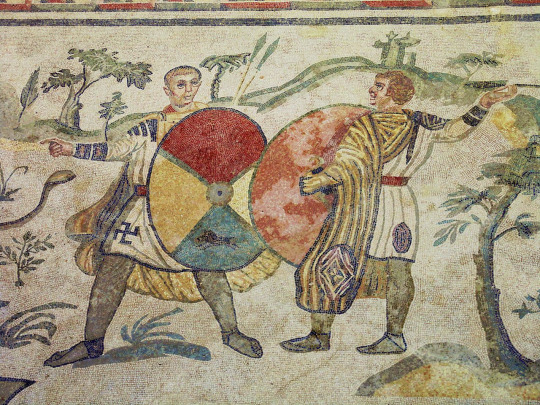
All over Europe thorough the early Middle Ages, the clothes were very similar in their basic shape and construction as in Rome and Greece. In Central and Northern Europe though people would wear pants under shorter tunics. There were exceptions to the everyone wearing a tunic trend. Celtic men wore braccae, which were pants, and short tunics and literally just shirts. Celts are the rare case, where I think we can say that men didn't wear dresses. Most other peoples in these colder areas wore at least knee-length tunics. Shorter tunics and trousers were worn again mostly by soldiers and slaves, so rarely any other woman than slave women. The trousers were though definitely trousers in Early Middle Ages. They were usually loose for easier construction and therefore not that similar to Roman leggings. However leggings style fitted pants were still used, especially by nobility. I'd say the loose trousers are a gray area. They wore both dresses and pants, but still definitely dresses. I'd say this style was very comparable to the 2000s miniskirts over jeans style. First one below is a reconstruction of Old Norse clothing by Danish history museum. The second is some celebrity from 2005. I see no difference.
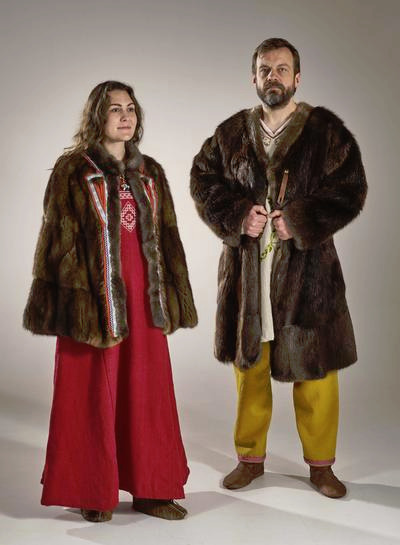

When we get to the high Middle Ages tunics are still used by both men and women, and still it's length is dependent on class and activity more than gender, but there's some new developments too. Pants and skirt combo is fully out and leggings' are back in in form of hose. Hose were not in fact pants and calling them leggings is also misleading. Really they are socks. Or at least that's how they started. As it has become a trend here they were used by everyone, not just men. During early Middle Ages they were worn often with the trousers, sometimes the trousers tucked inside them making them baggy. In high Middle Ages they became very long when used with shorter tunics, fully displacing the need for trousers. They would be tied to the waist to keep them up, as they were not knitted (knitting was being invented in Egypt around this time, and some knitting was introduced to Europe during middle Ages, but it really only took off much later during Renaissance Era) and therefore not stretchy. First picture is an example of that from 1440s. Another exciting development in the High Medieval era was bliaut in France and it's sphere of influence. Bliaut was an early attempt in Europe of a fitted dress. And again used by both men and women. The second illustration below from mid 12th century shows a noble man wearing a bliaut and nicely showing off his leg covered in fitted hose. Bliaut was usually likely fitted with lacing on the sides, but it wasn't tailored (tailoring wasn't really a thing just yet) and so created a wrinkled effect around the torso.
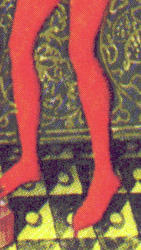

In the 14th century things really picked up in European fashion. European kingdoms finally started to become richer and the rich started to have some extra money to put into clothing, so new trends started to pop up rapidly. Tailoring became a thing and clothes could be now cut to be very fitted, which gave birth to fitted kirtle. At the same time having extra money meant being able to spend extra money on more fabric and to create very voluminous clothing, which gave birth to the houppelande.
Kirtle was once again worn by everyone. It wasn't an undergarment, for women that would be shift and men shirt and breeches, but it was an underlayer. It could be worn in public but often had at least another layer on top of it. The bodice part, including sleeves were very fitted with lacing or buttons (though there were over-layer kirtles that had different sleeves that changed with fashions and would be usually worn over a fitted kirtle). Men's kirtles were short, earlier in 14th century knee-length but towards the end of the century even shorter styles became fashionable in some areas. First picture below shows a man with knee-length kirtle from 1450s Italy.
Houppelande was also unisex. It was a loose full-length overgown with a lot of fabric that was gathered on the neckline and could be worn belted or unbelted. The sleeves were also wide and became increasingly wider (for men and women) later in the century and into the next century. Shorter gowns similar in style and construction to the houppelande were also fashionable for men. Both of these styles are seen in the second picture below from late 14th century.
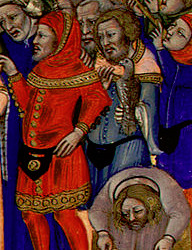
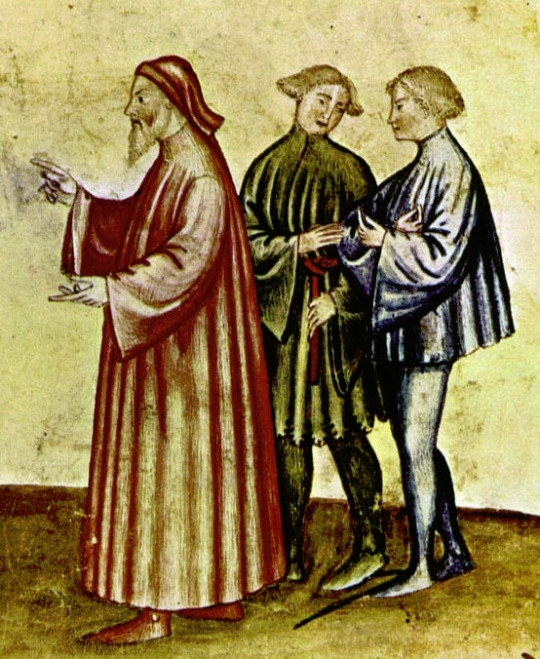
In the very end of 14th century, first signs of pantification of men can be seen. In France and it's sphere of influence the skirt part of the kirtle became so short it barely covered the breeches as seen below on these fashionable musicians from 1395-1400 France. Long houppelandes, length ranging from floor to calf, were still used by men though (the second picture, 1414 France), as were knee and thigh length gowns of similar loose style.
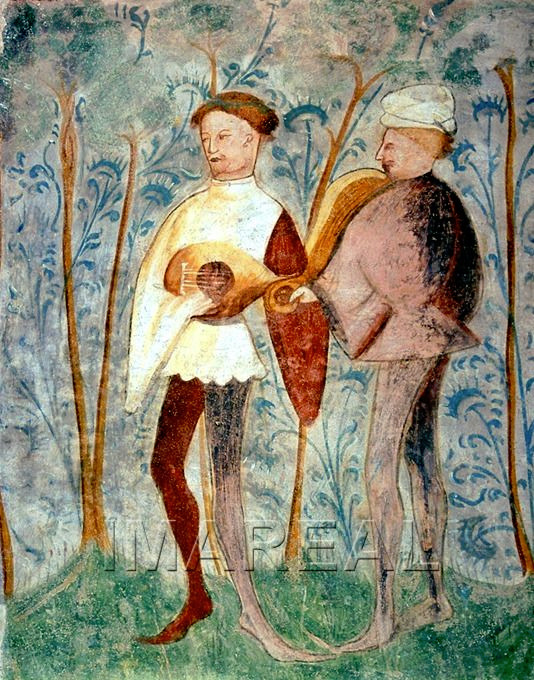
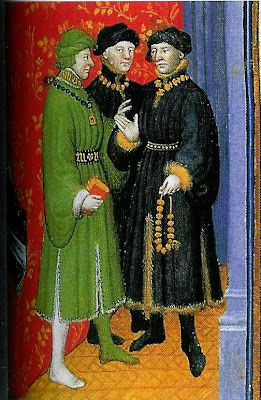
The hems continued to be short through the 15th century in France, but in other places like Italy and German sphere of influence, they were still fairly long, at least to mid thigh, through the first half of the century. In France at some point in late 13th century the very short under-kirtle started to be called doublet and they are just getting shorter in 1400s. The showing underwear problem was fixed by joined hose and the codpiece, signaling the entrance of The Sluttiest Era of men's fashion. Below is an example from 1450s Belgium of doublet and early codpiece in display. As you can see from the other figures, the overgowns of the previous century were also getting very, very short. In the next French example below from 1470s we can see the skirt shrink out of existence right before our eyes.
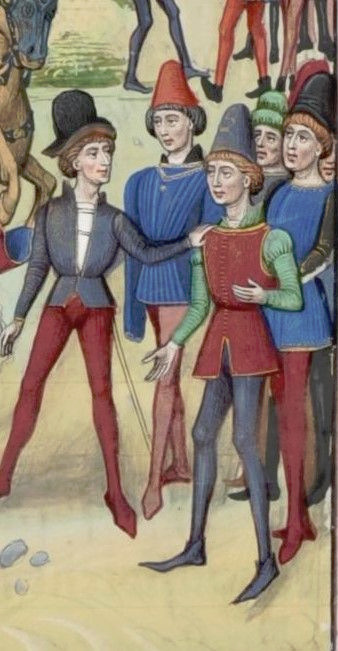
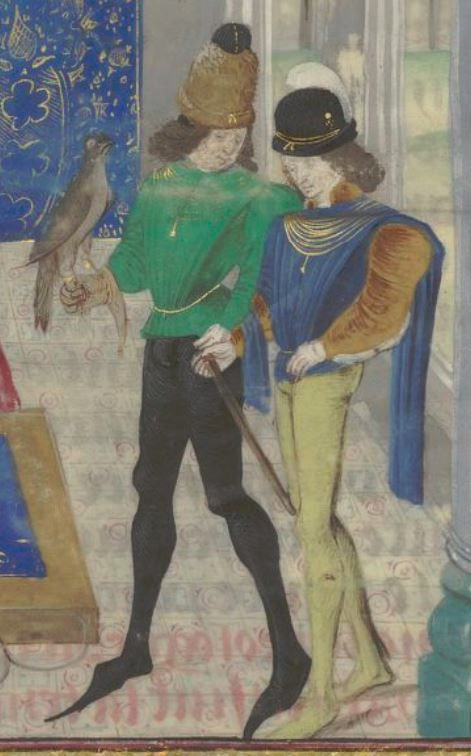
The very skimpy doublet and it's accompanying codpiece spread to the rest of the Europe in the second half of 15th century and it would only get sluttier from there. The Italians were just showing their full ass (example from 1490s). The dress was not gone yet though. The doublet and codpiece continued to be fashionable, but the overdress got longer again in the French area too. For example in the second example there's Italian soldiers in a knee length dresses from 1513.
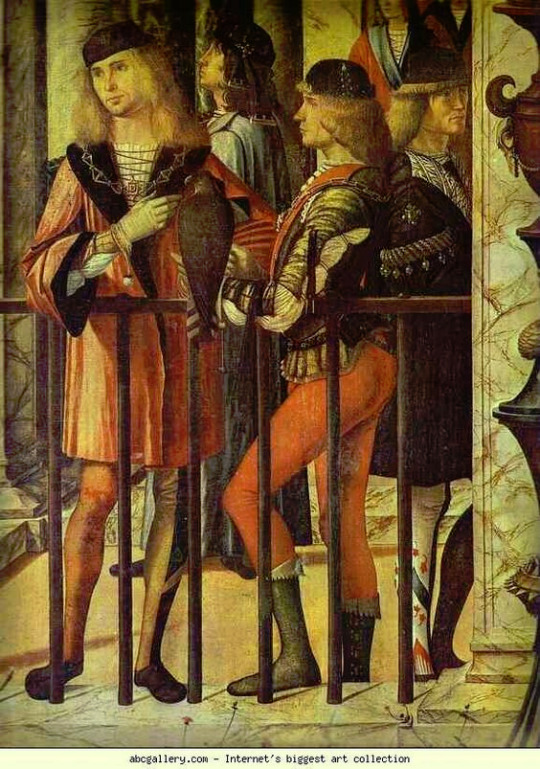
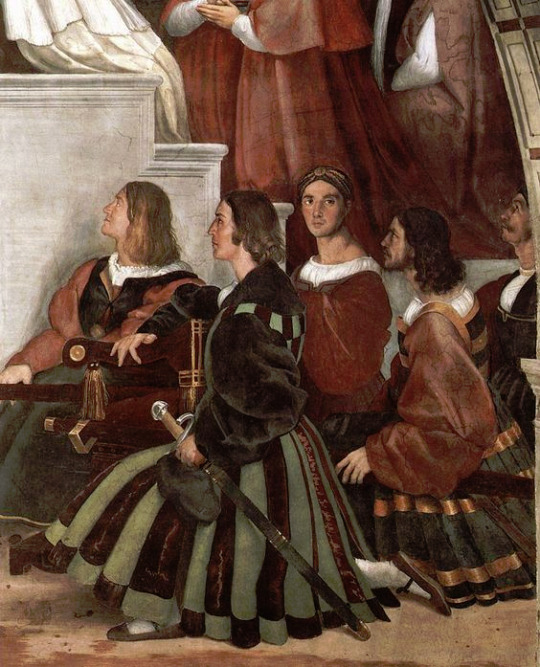
But we have to talk about the Germans. They went absolutely mad with the whole doublet and codpiece. Just look at this 1513 painting below (first one). But they did not only do it sluttier than everyone else, they also changed the course of men's fashion.
Let's take a detour talking about the Landsknecht, the mercenary pikeman army of the Holy Roman Empire. (I'm not that knowledgeable in war history so take my war history explanation with a grain of salt.) Pikemen had recently become a formidable counter-unit against cavalry, which earlier in the Medieval Era had been the most important units. Knights were the professional highly trained cavalry, which the whole feudal system leaned against. On the other hand land units were usually not made of professional soldiers. Landsknecht were formed in late 15th century as a professional army of pikemen. They were skilled and highly organized, and quickly became a decisive force in European wars. Their military significance gave them a lot of power in the Holy Roman Empire, some were even given knighthood, which previously wasn't possible for land units, and interestingly for us they were exempt from sumptuary laws. Sumptuary laws controlled who could wear what. As the bourgeois became richer in Europe in late Middle Ages and Renaissance Era, laws were enacted to limit certain fabrics, colors and styles from those outside nobility, to uphold the hierarchy between rich bourgeois and the nobles. The Landsknecht, who were well payed mercenaries (they would mutiny, if they didn't get payed enough), went immediately absolute mad with the power to bypass sumptuary laws. Crimes against fashion (affectionate) were committed. What do you do, when you have extra money and one of your privileges is to wear every color and fabric? You wear every color and fabric. At the same time. You wear them on top of each other and so they can be seen at the same time, you slash the outer layer. In the second image you can feast your eyes on the Landsknecht.

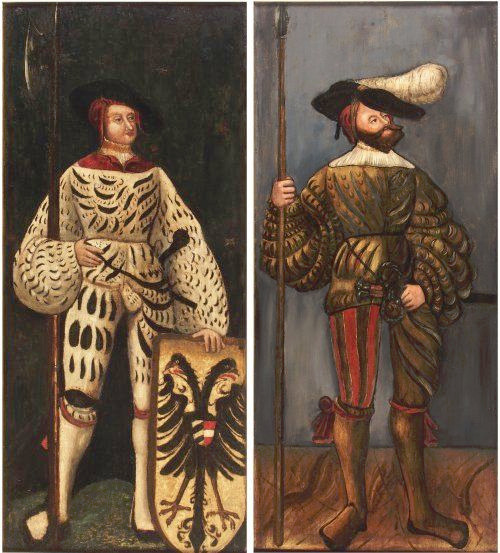
Just to give you a little more of that good stuff, here's a selection of some of my favorite Landsknecht illustrations. This is the peak male performance. Look at those codpieces. Look at those bare legs. The tiny shorts. And savor them.
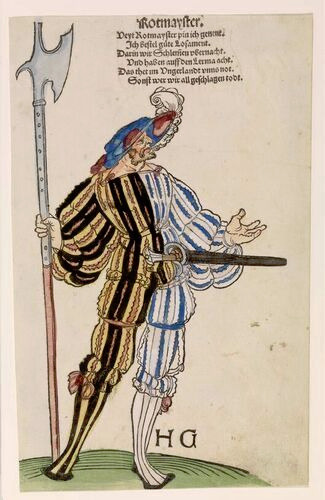
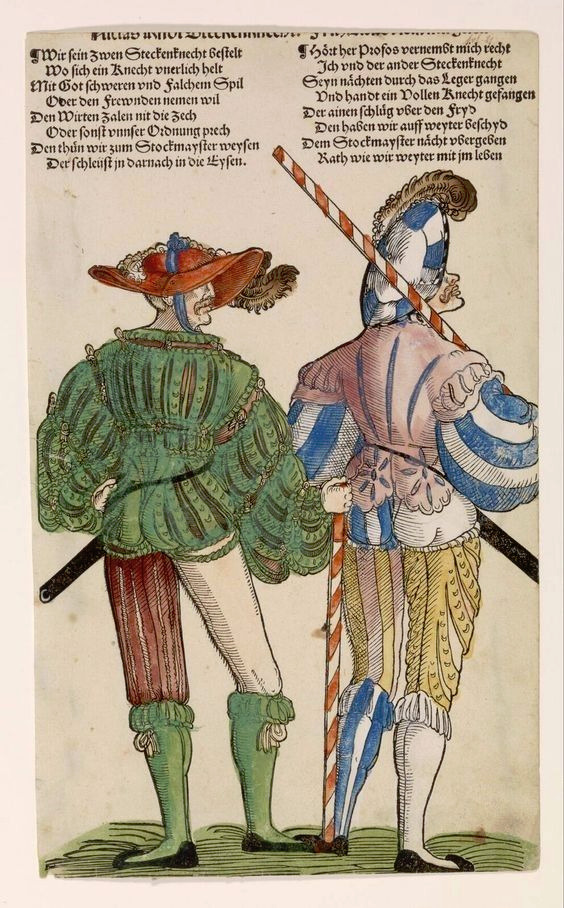
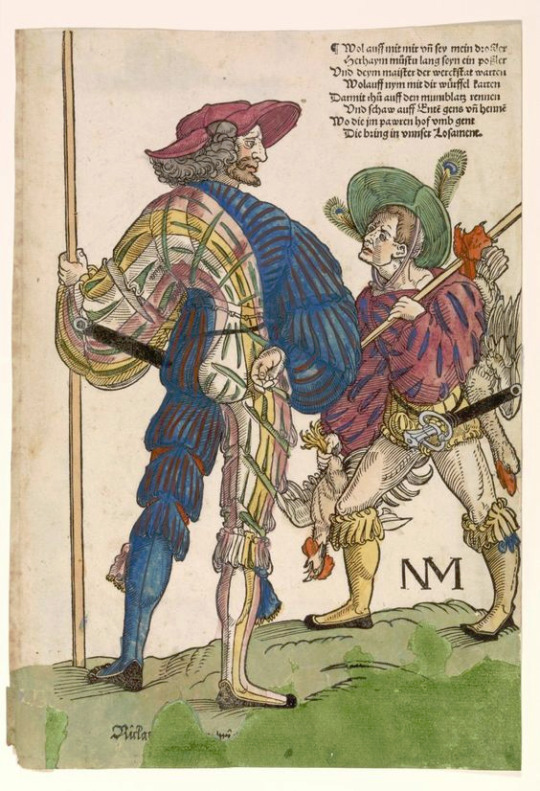
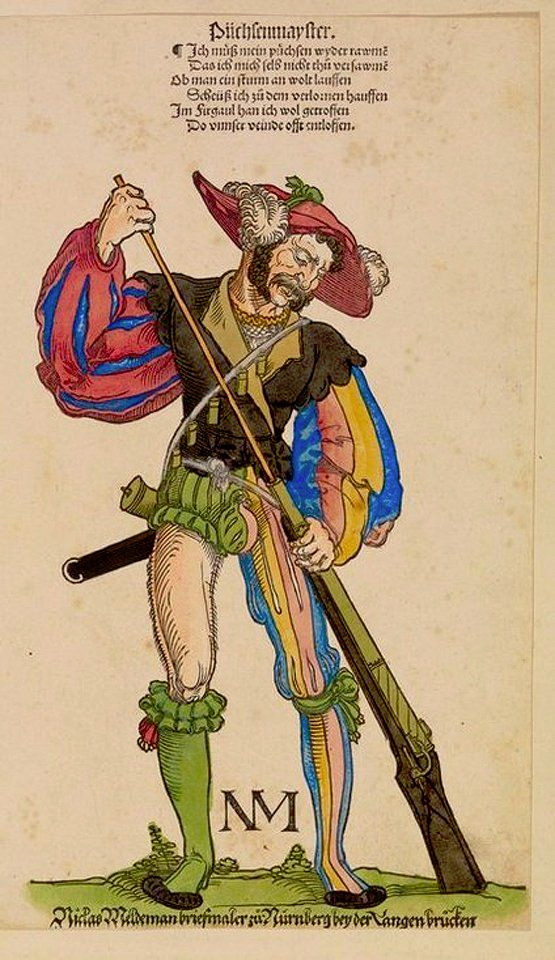
The Landsknecht were the hot shit. Their lavish and over the top influence quickly took over men's fashion in Germany in early 1500s. Slashing, the technique possibly started by them, but at least popularized by them, instantly spread all over Europe. That's how you get the typical Renaissance poof sleeves. They at first slashed the thighs of their hose, but it seems like to fit more of everything into their outfits, they started wearing the hose in two parts, upper hose and nether hose, which was a sort of return to the early Medieval trousers and knee-high hose style. The two part hose was adopted by the wider German men's fashion early in the century, but already in 1520s had spread to rest of Europe. It was first combined with the knee-length overdress that had made it's comeback in the turn of the century, like in this Italian painting from 1526 (first image). At this point knitting had become established and wide-spread craft in Europe and the stockings were born, replacing nether hose. They were basically nether hose, but from knitted fabric. The gown shortened again and turned into more of a jacket as the trunk hose became increasingly the centerpiece of the outfit, until in 1560s doublet - trunk hose combination emerged as the standard outerwear (as seen in the second example, 1569 Netherlands) putting the last nail on the coffin of the men's dress as well as the Sluttiest Era. The hose and doublet became profoundly un-slutty and un-horny, especially when the solemn Spanish influence spread all over with it's dark and muted colors.
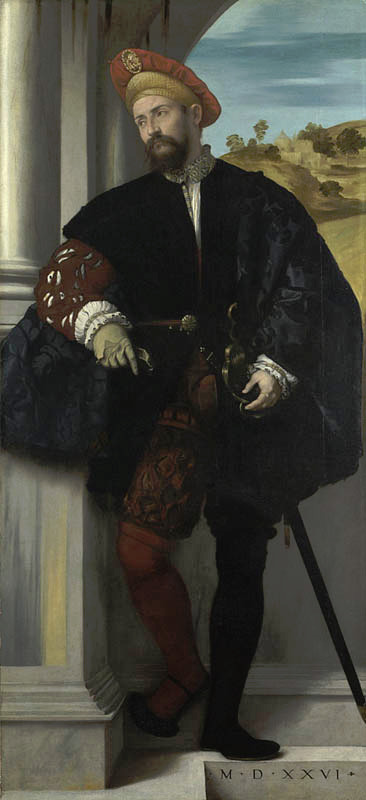
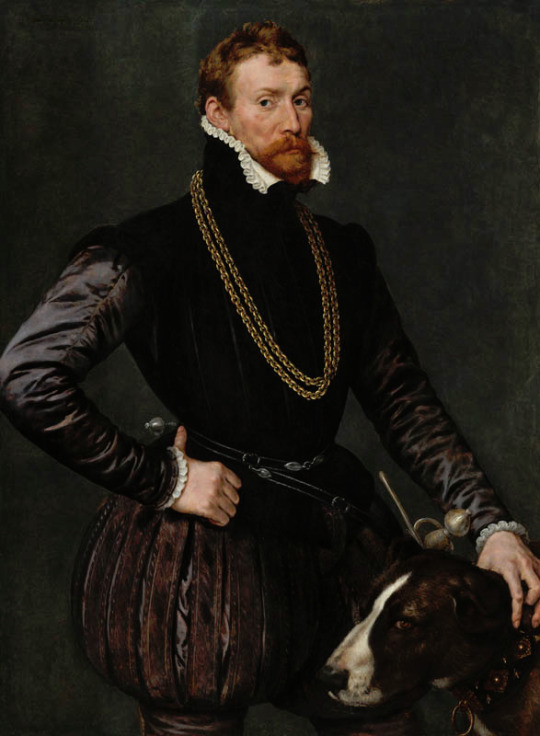
Especially in Middle Ages, but thorough European history, trousers have been associated with soldiers. The largely accepted theory is that trousers were invented for horse riding, but in climates with cold winters, where short skirts are too cold, and long skirts are still a hazard when moving around, trousers (with or without a short skirt) are convenient for all kinds of other movement requiring activities like war. So by adopting hose as general men's clothing, men in 1500s associated masculinity with militarism. It was not a coincidence that the style came from Landsknecht. I may have been joking about them being "peak male performance", but really they were the new masculine ideals for the new age. At the time capitalism was taking form and European great powers had begun the process of violently conquering the world for money, so it's not surprising that the men, who fought for money and became rich and powerful doing so, were idealised.
Because of capitalism and increasingly centralized power, the feudal system was crumbling and with it the feudal social hierarchy. Capitalism shifted the wealth from land ownership (which feudal nobility was built upon) to capital and trade, deteriorating the hierarchy based on land. At the same time Reformation and centralized secular powers were weakening the power of the Church, wavering also the hierarchy justified by godly ordain. The ruling class was not about to give up their power, so a new social hierarchy needed to form. Through colonialism the concept of race was created and the new hierarchy was drawn from racial, gender and wealth lines. It was a long process, but it started in 1500s, and the increasing distinction between men's and women's fashions was part of drawing those lines. At the same time distinctions between white men and racialized men, as well as white women and racialized women were drawn. As in Europe up until this point, all over the world (with some exceptions) skirts were used by everyone. So when European men fully adopted the trousers, and trousers, as well as their association to military, were equated with masculinity, part of it was to emasculate racialized men, to draw distinctions.
Surprise, it was colonialism all along! Honestly if there's a societal or cultural change after Middle Ages, a good guess for the reason behind it is always colonialism. It won't be right every time, but quite a lot of times. Trousers as a concept is of course not related to colonialism, but the idea that trousers equal masculinity and especially the idea that skirts equal femininity are. So I guess decolonize masculinity by wearing skirts?
#this has been sitting in my drafts almost finished for like a year or something#historical fashion#fashion history#fashion#history#dress history#men's historical fashion#renaissance fashion#medieval fashion#western fashion#western fashion history#landsknecht
3K notes
·
View notes
Text
jay as your boyfriend!



(soft moments with him)
contains: bf!Jay x gn!reader (implied that reader wears a dress but no pronouns were used) | genre: fluff | tw! mention of food, kissing, crowds | wc: 1,4k
reblogs, likes and comments are highly appreaciated!!!
other members’ versions: LHS - SJY - PSH - KSW - YJW - NRK

➶ wiping food off your face *ೃ༄
Jay and you were truly a match made in heaven. Both of you shared many hobbies, one of them being cooking and trying out new recipes from around the world. What you both enjoyed after cleaning up the kitchen from your activities was eating the meal you prepared. Sharing what you liked and disliked about the dish and discussing what to do next time to perfect the recipe you often got a bit of sauce or some scrumbles in the corner of your lips. They wouldn’t be there for long though, Jay was always quick to wipe it off your face.
“I really like the texture but I think it needs a little bit of lemon juice, don’t you think?” you asked taking another bite of the meal.
You looked at your boyfriend, Jay who sat in front of you. He looked down at his plate, brows furrowing as he munched on his bite.
“You think so? I would say more soy sauce would do,” he suggested looking at you.
“Actually I read somewhere that if something tastes bland it might need some sourness.” You took another bite.
As you were eating you noticed how a smile grew on his face. You were confused at first, but when he reached to your lips and wiped a sauce off them with his thumb you also put a smile on your face.
“Should we try it out now, then?”
➶ zipping up your dress *ೃ༄
Him doing that was a highlight of you getting ready for dates or when you just decided to wear a dress. The way he gently put your hair out of his way, his fingers delicately touching your skin while doing so. Usually, you would stand in front of a mirror while he helped you so he could see how you blushed when his eyes were plastered on yours for this whole time.
Jay turned you around so that he could face you after he was done zipping up your dress. Too mesmerized by the way your eyes held stars within themselves he just leaned in and plastered a passionate kiss, hands wandering on your sides, as you placed yours at the back of his neck, deepening the intimacy.
When you finally pulled out of each other’s arms you looked at him, a serious look suddenly appearing on your face.
“Jay Park, maybe you could tell me how I look? After all, you bought this dress,” you spoke and your confidence made you look even more attractive in his eyes.
He smiled and eyed you up and down, making you regret your question, feeling the blood rushing to your cheeks.
“Oh my dear Y/n, you look gorgeous,” he said and bent down to kiss your palm making you giggle to yourself at his chivalrous action. “You are gorgeous,” he said, this time putting your hair behind your ear and placing his warm hand on your cheek.
➶ smiling while you’re talking about something you’re passionate about *ೃ༄
Jay is a man of many hobbies. His passions like guitar, dance, singing, music in general, and his never ending curiosity of the world made him much more attractive in your eyes. What you didn’t know was that he had the same feelings when it came to you. He often found himself so immersed in how you’re telling him about what you found out about your fields of interest. Unconsciously he would smile slightly at the way your tone changed, how your gestures became bigger and your eyes shined with passion.
Jay listened carefully to your monologue about your recent obsession which was an ancient history of Rome. At first, he tried to join you in the talk since he also grew an interest in this period during his high school years, but then the pure urge to just listen to you talking avidly about it made him want to listen to your voice and watch how you couldn’t sit at one place from the emotions it brought to you.
The dreamy look on his face made you think for a second if he was truly listening to you.
“Jay? Are you listening to me?” you asked, worried he was bored by your rant.
“Of course, love,” he reassured you. “I love it when you’re talking about things that you’re curious about,” he confessed, helping you realize his true feelings about you.
➶ pulling you closer in his sleep *ೃ༄
For you and Jay nights together looked pretty similar. At first a little bit of talking about your plans for the next day, some soft loving touches, and then laying down to finish the day. You never had any problems with sleeping at night, but still, you couldn’t top how quick Jay was to doze off. And you couldn’t blame him - the amount of work he had during the day often drained him, yet he still tried to not let you know how sleepy he was at the moment. That’s why you were the one to fall asleep much later than him. Whenever you took a little longer to doze off, you felt his arms unconsciously wrap around your waist, bringing you closer to his body.
His hot breath fell on the back of your neck sending waves of shivers down your spine. Knowing he wouldn’t wake up from your movement you turned around to face him, his arms still messily wrapped around your body. Seeing his features in a faint moonlight that poured through your bedroom curtains made you smile to yourself. He looked so peaceful, the pout that formed on his lips made him even cuter than usual.
You raised your hand and gently brushed his short, black hair to the back, leaving a few scratches at the back of his head.
“I love you, my love,” you whispered and soon you also fell into a deep slumber.
➶ kissing your hands and tips of fingers *ೃ༄
When you first started dating Jay you didn’t expect how soft his heart truly was. Full of surprises he never failed to make you melt at his actions that expressed nothing but pure love and affection. What made your heart flutter the most was probably the way he kissed you dearly, especially your hands. Whenever you were getting ready to go to sleep he would take your hand in his and plant soft kisses on its back and tips of your fingers.
“Your hands are so soft,” Jay spoke in a baby voice making you giggle at his cute side.
Soon he started leaving tickling pecks all over your hands, firmly holding you as you tried to seize it from him, but it was all in vain.
“Jay it tickles!” Your laugh and the sensitivity of your fingers just made him want to tease you more. He only stopped when you pulled him into a sweet kiss, finally leaving your hand alone, now busy with your lips.
➶ taking your hand firmly in his when in a crowded place *ೃ༄
Knowing how uncomfortable you got in places where lots of people gathered, Jay took taking care of your comfort as his duty. And he was great at that, either by asking you questions if you wanted to go somewhere else or you were feeling good enough to stay. But in places where those solutions wouldn’t be possible he would simply take your hand firmly in his and forced your way through people that surrounded you. His grip and occasional thumb rubs made you feel a lot better.
You looked at the now pretty much-crowded place you were having your mini-date with Jay. The number of people there doubled or even trebled, making you feel how your heartbeat started to increase. Before it started to race you heard Jay’s soft voice in a room full of noise.
“Love, I think we should go as quickly as it’s possible. Let’s not wait, okay?” Jay suggested, a worried look making you feel at ease.
In response you simply nodded your head and grabbed his hand interlocking your fingers with his. He started guiding you through the crowd and worked your way to the exit. Your gaze was fixated either on your feet or his head, which turned around from time to time to check on you.
In a minute you were out, fresh and cool air hitting your skin helping you relax. In contrast to the inside the night seemed peaceful, just like you almost didn’t have to go through a huge amount of people.
“Are you okay, love?” you heard Jay question and smiled at him.
You climbed on your toes to plant a sweet kiss on his jaw.
“Yes, thank you, Jay.”

thank you for reading! back to the masterlist
permanent taglist: (send an ask to be added) @nicholasluvbot, @en-chantedtomeetyou, @kpopstanmeg, @skzenhalove, @nfrgirl, @edensgardenn (in bold can’t be tagged)
#kflixnet#enhanet#enhypen#enhypen fluff#enhypen fic#enhypen imagine#enhypen headcanons#enhypen x reader#enhypen jay#enhypen jongseong#jay fluff#jongseong fluff#jay fic#jongseong fic#jay imagine#jongseong imagine#jay headcanons#jongseong headcanons#jay x reader#jongseong x reader#jay x y/n#jongseong x y/n#jay x you#jongseong x you#park jay#jay park#park jongseong#park jongseong x reader
550 notes
·
View notes
Note
What do you think would our world be like if Christianity hadn't been invented? I'm not trying to start an anti-christianity argument, I am just wondering... Because it transformed our world and our cultures so much. For example, no Christianity = no colonization as we know it, would we still believe in heathen / nature gods or would another religion colonize the planet? What would that look like? Would we even have racism? Since "race theory" was invented by white christian colonizers to "justify" slavery.
I do think that it’s possible colonization would’ve happened in one form or another. What it would’ve looked like, I’m not sure. But people often forget that cultures with religions other than Christianity have historically erased and conquered.
As a Christian I don’t excuse the sins of those who share my faith. Their forgiveness is up to their victims, themselves, and God. And I recognize that Christians as a whole have a tendency to ignore our bloody history. But I also don’t think the world would necessarily be that much better without it. Different? Absolutely. Better? How would we know that? It wasn’t the only or first major religion to spread like wildfire. It wasn’t the only or first religion to be used to justify atrocities. Look at historical examples in Communist countries. Atheism being used to erase people’s religions. Look at the history of Islam. One of Mohammad’s first big feats was launching a military campaign. Look at Ancient Rome. Even though they let people keep their gods they still plugged their own gods in where they didn’t fit, used them to justify horrible atrocities, and severely discriminated against Jewish people.
People in power just want an excuse to justify their actions. Religion or lack thereof makes for a convenient excuse whether we like it or not. Without Christianity the world would still have power-hungry people looking to force their will on others and they’d find an excuse. Possibly in some other religion, possibly in something else. But Christianity became a world religion so long ago that I cannot tell you what I think would’ve happened exactly. If modern racism wasn’t invented something would still be contributing to discrimination.
Perhaps the cult of Isis would’ve taken over the world. It had some similar ideas to Christianity in some ways including a focus on love and a good afterlife for its followers and it was spreading a lot even though some tried to ban it. Maybe it was on its way to being the state religion before my guy Jesus showed up. And temples and shrines of Isis being erected in town squares would be the first step in colonizing an area.
Perhaps the Chinese would be the first to colonize the new world. Or the Arabs. If Islam existed in some form or another. Or even with their old gods. Perhaps the traders of west Africa or the Norse. If you ask me, someone at least was bound to make contact across the water one way or another and unfortunately bring diseases like smallpox and measles with them. What their response would’ve been, I’m not entirely sure. Humans are often xenophobic, but they are also often caring.
It’s taken centuries for the native populations of the Americas to return to their pre-Columbus numbers. Whether or not that recovery would’ve happened faster under different leadership, I’m unsure because as the different colonizers demonstrated over time, there’s many different ways to “deal” with native populations. The English preferred to drive them out, the Spanish attempted to absorb them through intermarriage, the French slowly encroached on their territory and disrupted and took over their economies. And later in Africa and Asia the goal by all was generally to use the land and it’s people as a resource rather than a place to live.
Colonization was an extreme example and expansion of pre-existing techniques and attitudes. There can be arguments made that something like colonization was inevitable eventually with expanding technology such as better ships and guns. There can also be arguments made that it wasn’t. That guns don’t promise colonization. Perhaps something akin to old empires would’ve happened instead. Which isn’t always much better but is more contained.
Whether or not Russia as it exists at the size it is today is also up for debate. Some would argue it’s inevitable. Someone setting up shop in that exact spot has several flat weak points of land easy to invade from so any empire in that spot would find that the only way to protect themselves would be to own all of the land surrounding them. Then again, perhaps nothing is inevitable and that patch of land would be conquered and reconquered switching hands forever.
Alternate history is almost pure speculation. It’s fiction. A popular genre of fiction. You can probably find a book out there telling a story about this if you like.
179 notes
·
View notes
Text
it's always a joke i see passed around, but it's also based in a misconception of it, but roman and greek mythology are vastly different.
roman gods and goddesses were named after objects and did not possess a gender, whereas greek gods were decided by human characteristics and traits.
2. greek gods had heavy emphasis placed on their physical appearance, both beauty, and unsightliness. the description of their physical appearance would come from the myth itself. greek mythology would describe the gods and goddesses as having strong characteristics. these characteristics would have a direct impact on the physical appearance they were given, while roman gods were not described in such a way. roman gods had less emphasis put on their characteristics; therefore, their physical appearances were less strong if there was a physical depiction of them at all.
3. many myths are told differently like the trojan war and odysseus' return.
4. in greek mythology, mortal greek heroes were just as important as greek gods and goddesses. greek heroes often had roles that taught life lessons that were just as important as the myths that were told about greek gods and goddesses. greek mythology emphasized the importance of good deeds mortals performed on earth. roman mythology was different in this way. roman mythology did not put emphasis on the works of mortal heroes in regards to their life on earth because roman mythology believed in an afterlife (greeks did too but not in a strong way as romans did).
5. the greek culture viewed deities as an unattainable being. this means that mortals would never be able to reach deity status and have a place among the gods they worshipped. instead, they would have to do good works on earth to have the honor of the gods during their time on earth. roman culture was different. romans believed that mortals should try to aspire to be like the gods they worshipped. part of the reason is that they used the roman gods and goddesses as an inspiration to live life the right way. the other reason is that they believed in an afterlife that they would attain when their life on earth was over.
6. the gods had much different attributes differing from greek and roman; ares was the unpredictable spirit of war, and he wasn't the most popular god, but in rome, mars was hugely popular and was worshipped much more than the greek ares. demeter was the goddess of the harvest and grains, while ceres was those things as well plus art and culture.
7. in greek mythology, the afterlife does not hold much importance. in fact, gods and mortals are regularly snatched from the afterlife and brought in to the present showing no concern for the afterlife. the greek perspective is much more concerned with the physical life on earth as opposed to the afterlife. mortals are remembered and rewarded for their good deeds on earth. in contradiction, the romans did good deeds to secure their place in afterlife. they could even earn a place among the gods and through their life on earth strove towards this goal.
i know it's funny to be like "romans copied greeks," i don't view it as copying and pasting, i view it as the being inspired by greek gods and greek mythology and applying it to their own religions, and that's not a weird, uncommon thing. greeks also borrowed from other cultures to form their own gods. ancient greeks borrowed from minoans, mycenaeans, egyptians and phoenicians. THAT IS NOT A BAD THING! greek language also helped expand the italian language as well, they expanded their own knowledge with knowledge they learned from greeks, and other cultures they came across.
another complaint i see is "they conquered greece, so greeks didn't have a choice." i don't know how to tell you this in the most polite way, but conquering land in this time was gigantic and very common and normal! how do you think the mongolians became so powerful, they didn't do it through peaceful encounters. everybody did it, it's how culture spread so rapidly through the ancient world, not to mention through trade.
i know it's funny to say the italians copied greeks, but get over yourself, it's not funny nor is it correct.
#ive seen many uneducated comments and i had to set some of the picture straight#greek mythology#roman mythology
274 notes
·
View notes
Text
If you were going to pin the BEGINNING of the downfall of the Roman Republic on the actions of one Roman
#roman history#ancient rome#roman empire#how often do you think about the roman empire#ancient history#julius caesar#pompey#caesar#pompeius magnus#the roman empire is my roman empire#gaius gracchus#gaius julius caesar#gaius marius#marian reforms#tiberius gracchus#the gracchi#sulla#lucius cornelius sulla#marcus licinius crassus#crassus#Pompey the great#i will cry over every vote for Pompeius
142 notes
·
View notes
Text
Things I watch out for when considering if a Roman history blog/community/media might have fascist leanings:
"Ironic" jokes that demean groups of people. These are often a cover for normalizing real prejudice against those groups.
Various dogwhistles and hate symbols. Also, check out the early warning signs of fascism.
Glorification of the military or the empire's size. It's one thing to be interested in a subject, but fascists tend to ignore the many problems of Rome's military and government, like corruption, mistreatment of veterans, abuse toward non-Roman people, and the occasional genocide.
Justifying historical oppression or abuse. This is different from merely explaining or trying to understand something. In case someone simply worded something poorly, I look at their additional posts or ask for clarification. If there's a pattern of downplaying/excusing oppression, that's a bad sign.
Power fantasies. Does a person (or community) seem to identify with the conquerors and overlords, because of their power? A person making jokes about Cicero's shitty poetry, or Augustus wearing platform shoes, is probably here for a different reason than someone talking about "putting the barbarians in their place."
Ignoring women's experiences, queer history, slaves and working-class experiences, and cultural diversity. At best this could just be a newbie who hasn't gotten around to those topics yet, which is fine. Learning takes time. But if a community, historian, or professionally published work makes Rome look like it's composed solely of rich white cishet guys...there is a problem.
Flattening history into Romans vs. outsiders. "Us vs. them" themes, also seen as "civilization vs. barbarians," or "virtue vs. moral decline/degeneracy," is endemic to bigoted worldviews. Not only is it demeaning toward other cultures, it also erases how multicultural and changeable Roman identity was over time.
Also, any modern person who seriously attributes Rome's fall to "moral decline" or "degeneracy" is either deeply ignorant or using a dogwhistle for homophobia, antisemitism and racism. Also, using "barbarian" or "savage" unironically.
Be extra alert for antisemitism. Shit like justifying Hadrian's actions, bringing up Jews when discussing Roman debt problems, or idolizing Vespasian or Titus. The Romans did a lot of bad shit in Judaea, and sometimes those stories attract antisemites today.
Use of the past to justify present-day harm or anger. Fascists and racists tend to get attached to "tradition" or "the good old ways" - or what they think is tradition - believing that this makes their bigotry more "normal" instead of "bizarre, hateful and reactionary." But just because something was common in the ancient world doesn't mean it's a good idea today.
There's a lot of anger and bitterness in fascist communities in general, in fact. Many people fall into the "alt-right pipeline" because their personal lives are deeply troubled, and those places give them someone to blame and feel superior to. If hanging out in a community seems to be making you angrier, more suspicious, or looking down on certain kinds of people, think carefully about whether this is a good community to be in.
And finally...fascists aren't all that interested in history. They care about their myth of good guys vs. evil outsiders, and they warp history to fit into that narrative. They might like the aesthetics, or symbols, or idolize a few famous dudes or battles. But rarely do they know, or care, about how Roman society worked, or how it changed over time, or anything less "glorious." Rarely do they actually want to learn or put in effort. My favorite example of "fascist laziness" is Mussolini's terrible film about Scipio Africanus, in which you can see telephone wires and the extras wearing wristwatches.
Feel free to add to this list. I am not an expert at spotting this stuff, and I probably missed some things. But I figured this might be a good starting point for others, too. Don't use this list to make "callouts" or harass people - it's usually more effective to block, avoid, and report extremists than to give them more visibility.
Conversely, a great way to protect yourself from falling into the alt-right pipeline is to learn more about how diverse the Roman world was! Check out studies of ancient women, disabilities, queer people, and decolonizing the classics! Not only will they broaden your horizons, they're also fascinating in their own right.
#jlrrt speaks#ancient rome#roman history#racism#the alt-right pipeline#fascism#bigotry#things to whack racists with#jlrrt essays
234 notes
·
View notes
Text
ISO
I ALMOST did it. I almost took the lazy modern way and just downloaded an AI art app and told it what I wanted. But I won't do it. Making a difference and saving art means not being lazy or cheap.
So with that said I know theres a lot of art blogs I follow and who follow me and all that good stuff so if anyone thinks they would be up for the challenge of illustrating some historical figures for me I'd be very happy to see some examples of your art style and if it's what I'm looking for and come to an agreement on commissions and stuff.
Namely I need Pompeius Magnus in the style of a Lee Pace looking dude... So give me Lee Pace with gingery curls in a toga or Roman general's uniform basically
#iso art#art#anti ai#no ai art#support the artist#Pompeius Magnus#Pompey the great#Pompey#art iso#illustrations#roman art#ancient rome#how often do you think about the roman empire#the Roman empire is my Roman empire#lee pace#toga#roman generals#alexander the great
6 notes
·
View notes
Note
hi!! i’m a classics major and am so entranced by your art and how you interact with history and literature, it really inspires me and expands my brain all the time. SO spicy.
anyways, I was wondering if you’d be comfortable talking a bit about your degree (s) and how they’ve influenced your artistic/critical analytical processes??
oh man, I have exactly zero degrees. like a true jester, I went to a trade art school, so I don't even have an art related degree, I've got a certification of surviving hell completion
the way art and history interact for me is that a lot of it circles back to trying to find ways to talk about something. history doesn't necessarily repeat, but it often rhymes, haunts, and cannibalizes. some eras of history are equal parts history and a stage, and a stage serves as a place to say something without necessarily having to be in it. the bossism politics of the philippines rhymes with the faction politics of the late republic more often than it doesn't. watching the marcoses crawl back into power was like watching the medici return to florence. duterte said he was like julius caesar crossing the rubicon, and over 6,000 were murdered under his regime. somethings are the same.
a lot of it feels like a puzzle, and I like it when pieces come together. more often than not, there's something current going on that prompts me to look back into history for something comparable, either as a stage, or just to feel like I'm not losing my mind, that other people had to deal with this shit too.
I was a teenager when the original assassin's creed games were coming out, and I used to go to libraries with other fans and we'd just sit in the non fiction sections and read everything that was on a shelf, and then go outside or whatever and start talking about where the games diverged from history and try to figure out what the next game would do based on whatever we learned. and I just kind of. kept doing that even when I stopped playing the games because the story sucked ass, but because there's already a second intersection of fiction working along side historical analysis, it unlocks a bunch of other stuff in the back of my mind while I take notes on something.
the gore you read in the thebaid reminds me a lot of imperial chines torture literature, and now we've got imperial horror and while we've moved out of the ancient Mediterranean but it's a whole body of work that I'm now looking at while thinking about rome, and somewhere in there, I'll probably find some literary theme that's cool and I'll start researching whether or not someone's examined like. the renaissance from that lens. what does the gore mean. what happens when history unfairly maligns and scapegoats someone. what happens when a foundational sacrifice goes wrong.
one of the most gut wrenching things I ever read was about how rome took any record of spartacus' words and buried it, and now I spend too much time thinking about what words we put in the mouths of dead people.
#also if it was not obvious. i have unmedicated adhd. which is why my brain frequently works like a horrible pin ball machine#ask tag#anyway! i have no idea if this answered your question but this is more or less how my brain works when i make stuff
78 notes
·
View notes